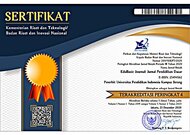Language and Socio-Emotional Development of Children with Speech Delays: Analysis of Gadget Use
Abstract
It is crucial to describe language development and socio-emotional behavior in children with speech delays. Many cases of speech delays in children are caused by the use of gadgets. Early detection of language and speech development problems, intervention programs carried out, and academic and socio-emotional development of children with speech and language disorders will greatly help overcome these problems. This study was conducted to describe language development and socio-emotional behavior in children with speech delays caused by the use of gadgets, early detection of language and speech development problems, intervention programs carried out, and academic and social-emotional development of children with speech and language disorders. The research was based on observations of a 9-year-old child, conducted from September 2018 to January 2019, with data collection since 2012 when language and speech disorders were early detected. The research applied a qualitative approach, with a case study method, while the data collection was through observation, interviews, and documentary studies. This study’s findings showed that the socio-emotional behavior caused by the influence of the gadget use had a major effect on children's development with speech delay problems; thus, an appropriate intervention program is needed for the family and environment. These results have implications for helping children with language and speech problems, not only being strictly allowed to use gadgets but also directed to obtain stimuli to reduce excessive socio-emotional levels in these children.
Keywords
Full Text:
PDFReferences
Aswadi, D. (2019). Pengaruh gawai terhadap wicara anak di era disrupsi (Kajian psikolinguistik). Stilistika: Jurnal Bahasa, Sastra, dan Pengajarannya, 4(2), 165–174.
Fimawati, Y., Dhanawaty, N. M., Sukarini, N. W. (2017) Kemampuan berbahasa anak autis tipe PDDNOS di SLB Muhammadiyah Sidayu Gresik: Kajian psikolinguistik. Linguistika: Buletin Ilmiah Program Magister Linguistik Universitas Udayana, 24(2), 203–212.
Fitriyani, F., Sumantri, M., & Supena, A. (2018). Gambaran perkembangan berbahasa pada anak dengan keterlambatan bicara (speech delay) : Study Kasus pada anak usia 9 tahun kelas 3 SD di SDS Bangun Mandiri. Prosiding Seminar dan Diskusi Nasional Pendidikan Dasar 2018, 59–64.
Fitriyani, F., Sumantri, M., & Supena, A. (2019). Language development and social emotions in children with speech delay: Case study of 9 year olds in elementary school. Jurnal Konseling dan Pendidikan, 7(1), 23–29.
Gani, S. A. (2016). Parenting digital natives: Cognitive, emotional, and social developmental challenges. International Conference on Education (ICE) 2016, dated November 22-24, 2016 (pp. 870–880). Malang: Graduate School, Universitas Negeri Malang.
Jane, G., & Tunjungsari, H. (2015). Parents and speech therapist perception of parental involvement in Kailila Therapy Center, Jakarta, Indonesia. Journal of Education and Practice, 6(8), 111–117.
Novitasari, W., & Khotimah, N. (2016). Dampak penggunaan gadget terhadap interksi sosial anak usia 5-6 tahun. Paud Teratai, 5(3), 182–186.
Pebriana, P. H. (2017). Analisis penggunaan gadget terhadap kemampuan interaksi sosial pada anak usia dini. Jurnal Obsesi: Jurnal Pendidikan Anak Usia Dini, 1(1), 1–11.
Rachmat, I. F. (2021). Pengaruh kecanduan gawai terhadap disregulasi emosi anak usia dini. Jurnal Jendela Bunda Program Studi PG-PAUD Universitas Muhammadiyah Cirebon, 8(2), 33–45.
Radliya, N. R., Apriliya, S., & Zakiyyah, T. R. (2017). Pengaruh penggunaan gawai terhadap perkembangan sosial emosional anak usia dini. Jurnal PAUD Agapedia, 1(1), 1–12.
Rajesh, V., & Venkatesh, L. (2019). Preliminary evaluation of a low-intensity parent training program on speech-language stimulation for children with language delay. International Journal of Pediatric Otorhinolaryngology, 122, 99–104.
Saroinsong, W. P., & Khotimah, N. (2016). Gadget usage inhibited interpersonal intelligence of children on ages 6-8 years old. Jurnal Tekpen, 1(4), 941–952.
Sihura, F. (2018). The role of parents" Generation of Z" to the early children in the using of gadget. Advances in Social Science, Education and Humanities Research, 249, 55–59.
Sunanik, S. (2013). Pelaksanaan terapi wicara dan terapi sensori integrasi pada anak terlambat bicara. Nadwa: Jurnal Pendidikan Islam, 7(1), 19–44.
Suparmiati, A., Ismail, D., & Sitaresmi, M. N. (2016). Hubungan ibu bekerja dengan keterlambatan bicara pada anak. Sari Pediatri, 14(5), 288–291.
Suryati, N. (2020). Optimalisasi peran orang tua dalam meminimalisir penggunaan gawai bagi anak. Taujihat: Jurnal Bimbingan Konseling Islam, 1(1), 47–65.
Tartila, A. (2017). Pengaruh gawai terhadap pemerolehan bahasa pada anak usia 4 tahun dengan analisis sintaksis. SeBaSa: Jurnal Pendidikan Bahasa dan Sastra Indonesia 3(1), 49–55.
Wahyuni, A. S., Siahaan, F. B., Arfa, M., Alona, I., Nerdy, N. (2019). The relationship between the duration of playing gadget and mental emotional state of elementary school students. Open Access Macedonian Journal of Medical Sciences, 7(1), 148–151.
DOI: https://doi.org/10.17509/ebj.v3i1.33187
Refbacks
- There are currently no refbacks.
Copyright (c) 2021 Universitas Pendidikan Indonesia
This work is licensed under a Creative Commons Attribution 4.0 International License.
This journal is indexed by




.png)




.png)
1.png)


1.png)

.png)